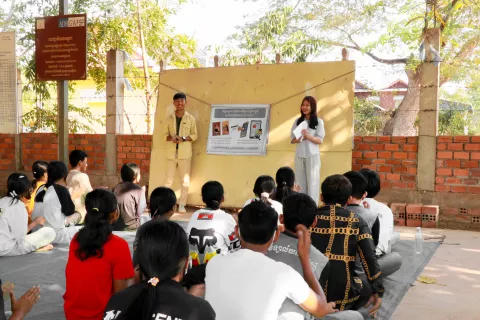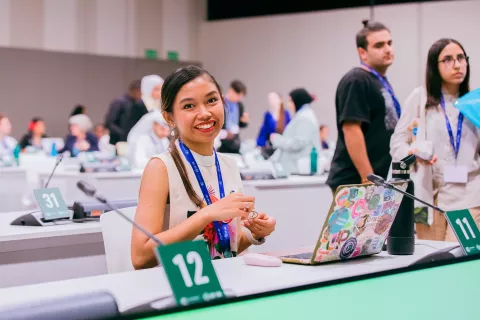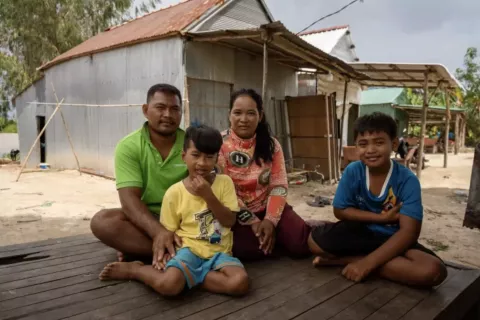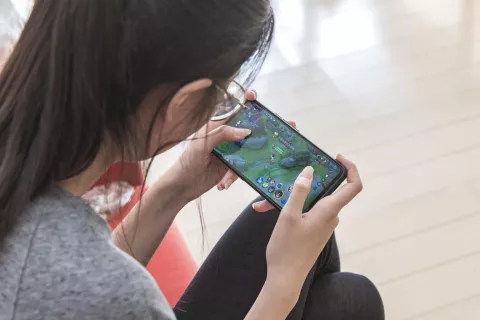16 March: On World Social Work Day, UNICEF East Asia and Pacific, together with ASEAN, is launching #StandTogetherforSocialWorkers campaign for 2021 to raise awareness of the critical role the social service workforce plays in the lives of children, families and communities in the region.
The social service workforce is instrumental in supporting the most vulnerable and marginalised communities, promoting social justice, reducing discrimination and causes of inequality, alleviating poverty, and promoting resiliency to shocks. Without their contribution, we cannot attain the Sustainable Development Goals and effectively mitigate against the socio-economic impact of COVID-19.
For children, social workers are on the frontline of protecting them from violence, abuse, neglect and exploitation, keeping them safely together with their families and promoting their wellbeing. And as containment measures that were put in place to stop the spread of COVID-19 inadvertently increased protection risks for children, social workers put themselves in harm’s way to provide vital support.
However, their value is not widely recognized in the region, impacting negatively on investment and support. The need to tackle negative public perceptions was recognized in the Hanoi Declaration for Strengthening Social Work for Cohesive and Responsive adopted by the ASEAN Heads of State in November 2020; this campaign is a key contribution to the implementation of the Declaration.
Under-resourced, under-staffed and under-supported
While the job of a social worker is skilled, complex and challenging, in most South-East Asian countries, social work is still not recognised as a profession by law. Instead, they are viewed as carrying out charity work. Limited public understanding of their role and value impacts demand for services and investment in social work.
Making a difference
In Tha Sala Sub-District, Lopburi Province, Thailand, Kittiya Srisuttho works tirelessly as a social worker in the Local Administration Organization, tackling a range of issues, including supporting children and families impacted by poverty and violence, children and adults with disabilities/ HIV, and the elderly.
Following a referral about a child absent from school, Kittiya conducted a home visit with a multi-disciplinary team, which included speaking directly to the child.
"Children want someone who listens without any judgement; someone they can trust” Kittiya Srisuttho, Social Worker, Thailand
The assessment found that the child had communication challenges and that the father was unable to provide nurturing care due to substance abuse issues and financial issues. With the team, Kittiya ensured the child received a rapid diagnosis at a hospital, identifying a learning disability and the developmental assistance needed. Alternative care was sought and after an assessment, the child was safely reunified with the mother, who was supported to provide effective care.
Given the criticality of the role of social workers for local communities, Kittiya states: “if we have more social workers, it can help improve the system to better serve vulnerable groups."
Transforming public perceptions to transform investment
Promoting positive public perceptions is therefore critical to transforming social work, creating demand from the communities being served to invest in social workers and raising awareness amongst policy makers.
This joint campaign highlights the wide-ranging role played by social workers, including for families in economic crisis, children and families hit by natural disasters, for children suffering violence, children separated from their families, children in conflict with the law, and children with disabilities.
"My daily work is providing support for children in emergency situations and in need of special protection” Fatmawati, Social Worker, Indonesia
“As a social worker, you become an instrument of change in someone’s life”. Maria Lourdes Garduce, Social Worker, the Philippines
We hear directly from social workers across the region, not only about their contribution to supporting vulnerable communities and their recommendations for strengthening social work, but also what drew them to the profession and what motivates them to continue.
“When I started social work, I knew I was born for this job” Le This Phien, Social Worker, Viet Nam
While innate passion for the work drives many social workers, they must receive the recognition, investment and support they require to deliver for the most vulnerable in society.
The campaign, therefore, also calls for the fulfilment of the commitments made through the adoption of the 2020 Hanoi Declaration to invest in and expand social work and the social service workforce. This includes: identifying social service workforce needs of each country; mobilising public resources to expand the workforce; reforming legislation to professionalise social work; building the capacity of the workforce through quality supervision, coaching and pre-service and in-service training and education; and improving recruitment and retention of social workers by increasing job satisfaction and opportunities for career development.
The campaign message is clear – we must collectively recognize the invaluable contribution of social workers and ensure they are effectively supported to be equipped to provide vital support to communities and the most vulnerable in our societies, including children.
“My hope and dream is that this social work profession will be recognized in Malaysia”, Siti Syafiqah Binti Hasan, Social Worker, Malaysia
Strengthening the social service workforce is at the heart of UNICEF’s engagement on child protection and reaching the most vulnerable and marginalized, including children with disabilities and children affected by migration. UNICEF supported the development of the Hanoi Declaration and is now providing assistance to ASEAN and its Member States to translate the Declaration into action.
By valuing social workers as the heroes they are, we will secure a better future for millions of children, women and vulnerable families.
About the author:
Rachel Harvey is the Regional Advisor for Child Protection at UNICEF EAPRO
NOTES
World Social Work Day is the key day in the year that social workers worldwide stand together to advance a common message globally. This year’s theme of World Social Work Day is ‘Ubuntu’ – ‘I am because we are’ – Strengthening Social Solidarity and Global Connectedness. #WSD21
The ASEAN-UNICEF regional campaign echoes this theme, adopting the hashtag – #StandTogetherforSocialWorkers
The social service workforce is an inclusive concept referring to a broad range of governmental and non-governmental professionals and paraprofessionals who work with children, youth, adults, older persons, families and communities to ensure healthy development and well-being. The social service workforce focuses on preventative, responsive and promotive services that are informed by the humanities and social sciences, Indigenous knowledges, discipline-specific and interdisciplinary knowledge and skills, and ethical principles. Social service workers engage people, structures and organizations to: facilitate access to needed services, alleviate poverty, challenge and reduce discrimination, promote social justice and human rights, and prevent and respond to violence, abuse, exploitation, neglect and family separation. (Global Social Service Workforce Alliance)






